Is Antifa a gang? Trial in street brawl at pro-Trump rally opens a landmark legal test
The trial of two men, charged in a 3-year-old street brawl in a California beach town, could soon reshape the image of one of the most debated political movements in America: Antifa.
Opening arguments Tuesday laid out conflicting views about the roles Brian Lightfoot and Jeremy White played in a heated protest in the San Diego neighborhood of Pacific Beach on Jan. 9, 2021, three days after the Capitol insurrection.
That day, far-right protesters ended up in a string of violent brawls with anti-fascist counterprotesters. Prosecutors, however, focused solely on Antifa, charging 11 defendants with dozens of felonies.
The prosecution's case rests not just on proving that Lightfoot and White engaged in the acts they’re accused of – hardly in dispute, as they’re caught on camera from multiple angles – but that they did so as part of a broader conspiracy to commit violence. That conspiracy, Harvey and her team have argued, was organized under and inspired by the banner of Antifa, a political movement of far-left militants who oppose neo-Nazis and white supremacists at demonstrations and other events.
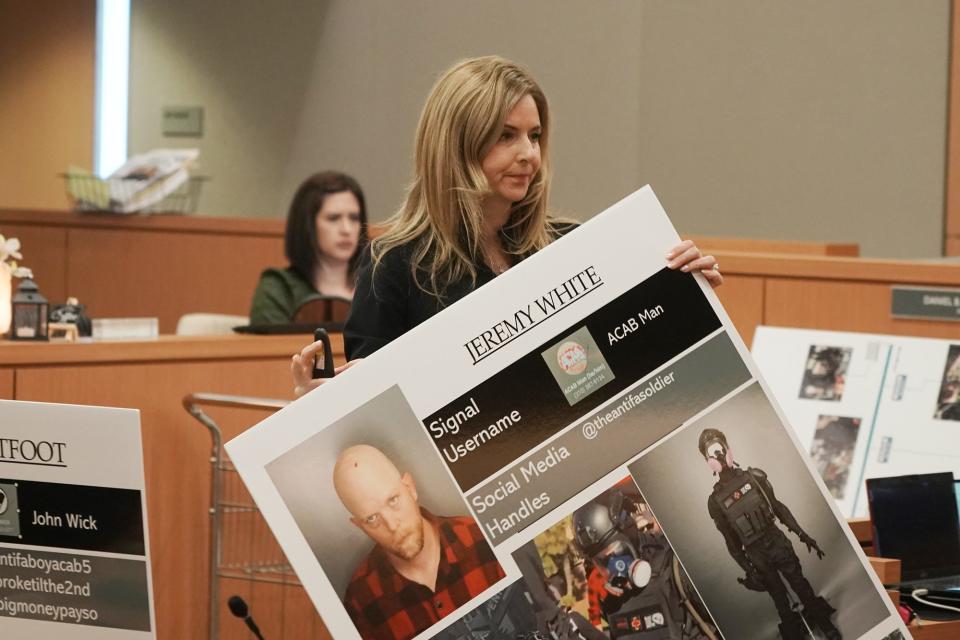
But defense attorneys argued the case opens the door for conspiracy allegations against anyone who protests against fascism, or even dresses in black. “It has a chilling effect on political expression,” said attorney John Hamasaki, who is representing Lightfoot.
Of 11 original defendants, nine made deals with prosecutors. White and Lightfoot, represented by activist attorneys, took the case to trial, stressing its importance not just to them, but to protesters against fascism across the country.
A gang-style conspiracy conviction could effectively double any prison sentence. If successful, it could be used as a blueprint for prosecutors across the country, according to legal experts. It could also bolster a right-wing political narrative that has claimed Antifa is not just a political ideology, but a dangerous group.
“This case opens the door for any prosecutor to approach any protest where people are either anti-fascist or dressed in black and to pursue them under a conspiracy,” said attorney John Hamasaki, who is representing Lightfoot. “It has a chilling effect on political expression.”
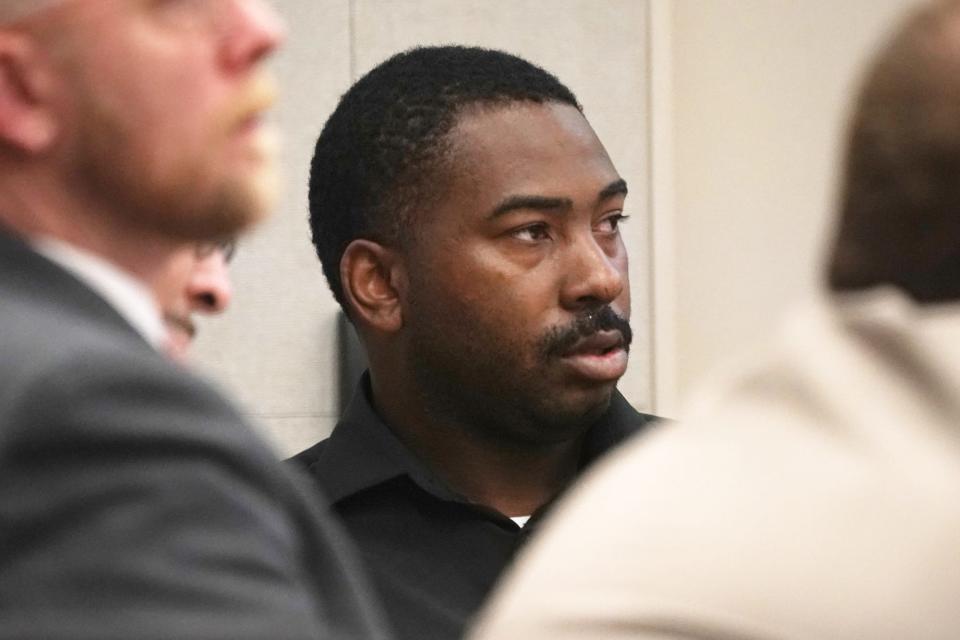
But the prosecution’s high-profile approach has been criticized, in part because the two-sided street brawls only led to charges for one side. Video from the day showed fights involving people affiliated with the extremist group the Proud Boys and local white supremacist factions.
Yet the office of San Diego District Attorney Summer Stephan chose to prosecute only black-clad anti-fascists. Stephan, a longtime Republican who left the party and ran in the nonpartisan DA election, has a history of supporting conspiracy theories about Antifa.
On Tuesday morning, prosecutors painted Antifa as a menace to society.
In her opening statement, Deputy District Attorney Makenzie Harvey played numerous videos of the 11 incidents of violence from Jan. 9 that prosecutors have focused on, some of which only tangentially involved, or didn’t at all involve, either of the defendants.
White, Lightfoot, and their alleged co-conspirators came to San Diego “with the intention to shut down the speech and the assembly of a patriot group, for the simple fact that they didn’t agree with their beliefs,” Harvey told the jury. “You will see that these defendants and their co-conspirators arrived in San Diego dressed and armed and prepared for violence.”
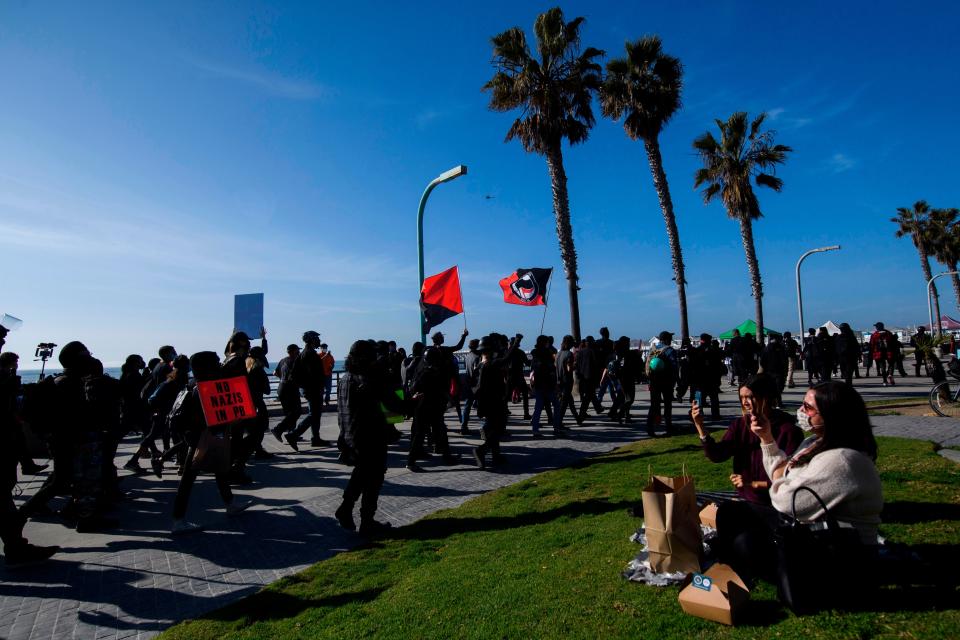
Harvey said prosecutors will show the jury secret communications between anti-fascists from San Diego and Los Angeles that prove the defendants were always intent on committing violence against peaceful, patriotic protestors.
Attorneys for the two defendants sought to poke holes in the broader conspiracy argument and to distance their clients from the violence.
Hamasaki described his client as a wildland firefighter in training, who grew up in poverty in South-Central Los Angeles. Leading up to, and during, the social justice uprisings following the murder of George Floyd, Lightfoot became fascinated by the anti-fascist movement, Hamasaki said. So he bought some equipment and hit the streets to protest against what he believes are malevolent racist and fascist far-right actors.
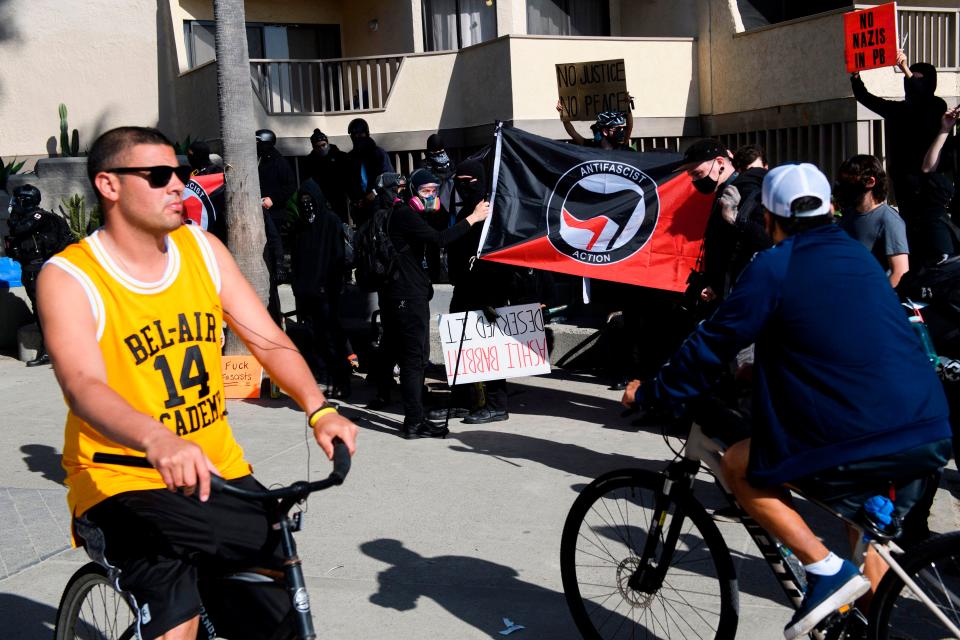
“Anti-fascism is an ideology, it’s a belief system – It’s saying ‘I am opposed to fascism,'” Hamasaki said. “The prosecution said the net is pretty wide for who they consider fascists – that it’s not just white supremacists and neo-Nazis but also Trump supporters – I think you’re going to find in this case there’s some overlap in that.”
Representing White, San Francisco attorney Curtis Briggs said his client came to Pacific Beach equipped as a medic and ready to help fellow anti-fascists who might be injured during the protests. White attended protests and rallies across the country, Briggs said, even winning a Certificate of Congressional Recognition for his activism on behalf of Sen. Bernie Sanders.
As he witnessed fellow protesters increasingly attacked by far-right agitators, White “put on a suit of armor” which included a helmet emblazoned with the message “When the shooting starts, get behind me,” and stepped into the fray, Briggs said.
And Briggs noted that the people listed as victims in the DA’s case carried weapons of their own: at least two knives, a replica gun, gloves with kevlar-reinforced knuckles and pepper spray.
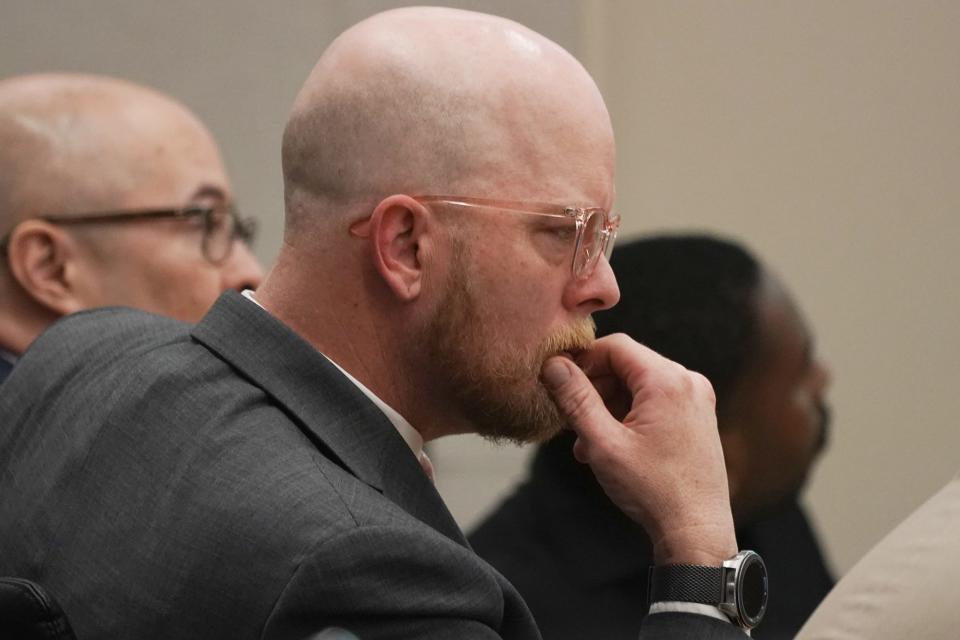
As USA TODAY first reported in 2022, those victims include people identified by activists as white supremacist agitators notorious for spurring fights in neighborhoods where they're not welcome. At least one has a criminal record and has long been involved with neo-Nazi groups.
“Please pay close attention to whether the people on the stand have vice – whether they’re really victims or not – and approach the prosecution’s case with healthy skepticism,” Briggs told the jury.
Prosecutors, however, filed a successful, wide-ranging motion in the case a few weeks ago that severely limits how the defense attorneys may describe the pro-Trump protesters from the day of the crimes.
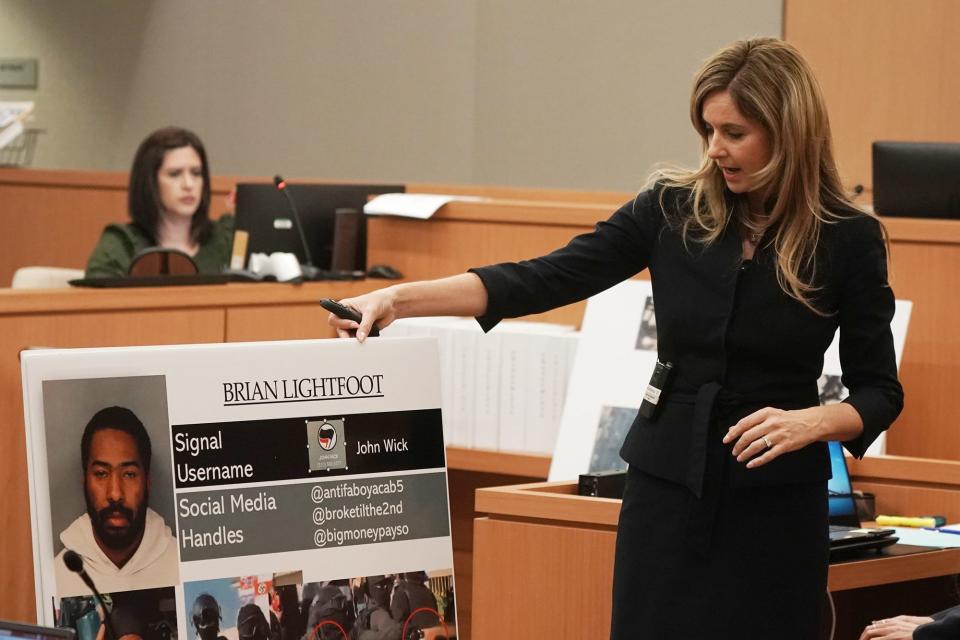
Throughout the opening arguments, the prosecutors objected to every mention by defense attorneys of well-known groups including the Proud Boys, the Oath Keepers, the Three Percenters and local San Diego neo-Nazi organizations. At one point, Judge Daniel Goldstein halted proceedings and dismissed the jury before chastising Hamasaki for using such terms, noting that he had ruled on this matter “at least seven times.”
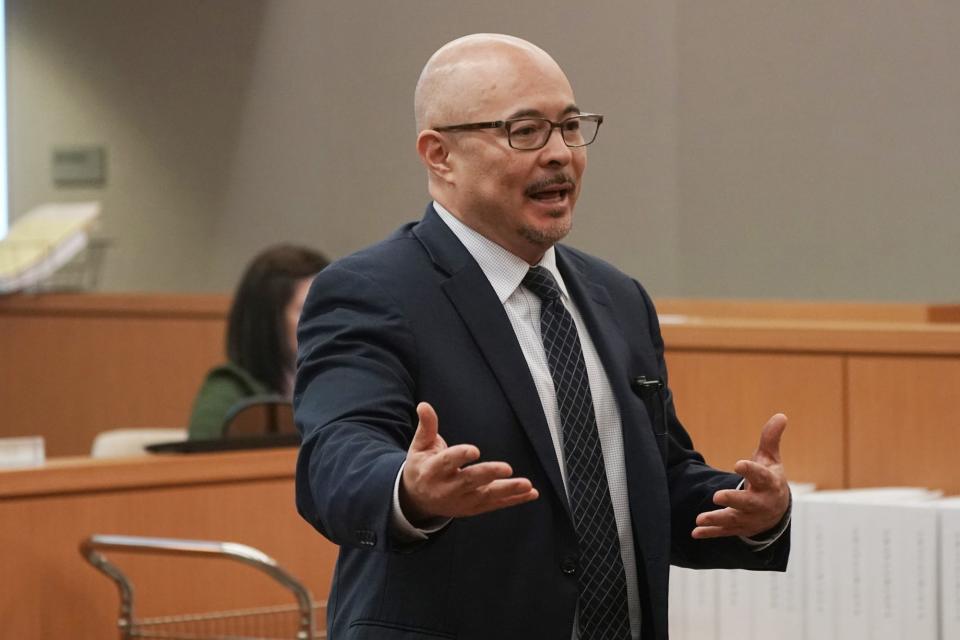
Investigation: California statehouse candidate says she didn't join Capitol riot. Video shows otherwise
San Diego community advocate Tasha Williamson, who attended trial in support of White and Lightfoot, said she was upset by what she saw as inequity.
“Clearly, the district attorney only believes in the First Amendment rights of white supremacists, not the rights of people who look like me,” Williamson, who is Black, said. “I heard ‘Antifa’ so many times, but not 'Proud Boys,' or ‘American Guard’ or ‘Defend East County’ or any of these people who have threatened my life, my family’s life, who are known white supremacists.”
She added: “You can’t even utter those words in that courtroom, and I’m ashamed to have to walk through these doors, where it says justice everywhere. This isn’t justice.”
Members of the prosecution said they could not comment on the case.
While the two face charges with varying sentences, Lightfoot could serve up to 18 years if convicted. The trial is expected to continue through the rest of the month.
This article originally appeared on USA TODAY: After Pacific Beach Proud Boys rally, trial tests Antifa legal theory
